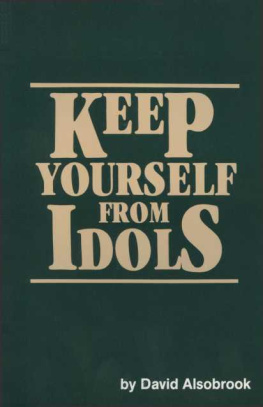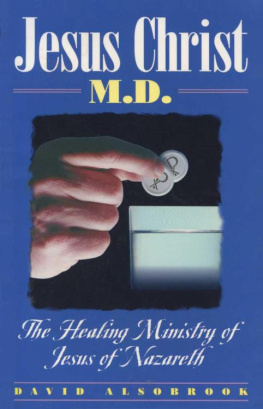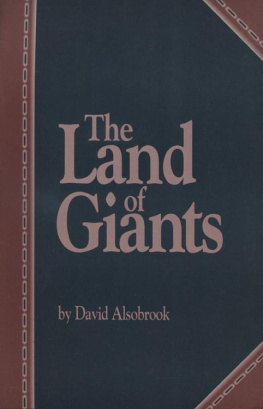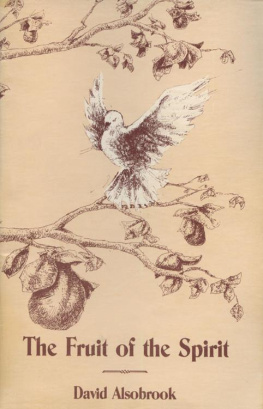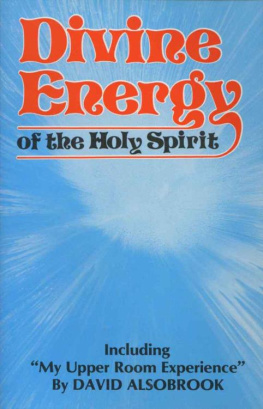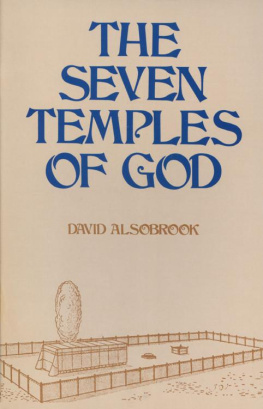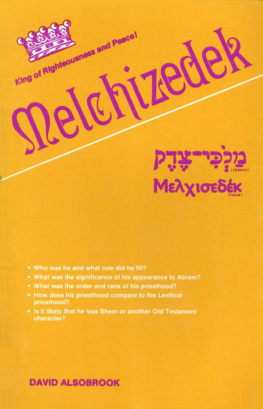David Alsobrook - Keep yourself from idols
Here you can read online David Alsobrook - Keep yourself from idols full text of the book (entire story) in english for free. Download pdf and epub, get meaning, cover and reviews about this ebook. City: Paducah, KY, year: 1986, publisher: David Alsobrook, genre: Religion. Description of the work, (preface) as well as reviews are available. Best literature library LitArk.com created for fans of good reading and offers a wide selection of genres:
Romance novel
Science fiction
Adventure
Detective
Science
History
Home and family
Prose
Art
Politics
Computer
Non-fiction
Religion
Business
Children
Humor
Choose a favorite category and find really read worthwhile books. Enjoy immersion in the world of imagination, feel the emotions of the characters or learn something new for yourself, make an fascinating discovery.
- Book:Keep yourself from idols
- Author:
- Publisher:David Alsobrook
- Genre:
- Year:1986
- City:Paducah, KY
- Rating:4 / 5
- Favourites:Add to favourites
- Your mark:
- 80
- 1
- 2
- 3
- 4
- 5
Keep yourself from idols: summary, description and annotation
We offer to read an annotation, description, summary or preface (depends on what the author of the book "Keep yourself from idols" wrote himself). If you haven't found the necessary information about the book — write in the comments, we will try to find it.
Keep yourself from idols — read online for free the complete book (whole text) full work
Below is the text of the book, divided by pages. System saving the place of the last page read, allows you to conveniently read the book "Keep yourself from idols" online for free, without having to search again every time where you left off. Put a bookmark, and you can go to the page where you finished reading at any time.
Font size:
Interval:
Bookmark:
Contents
Foreword
The Holy Spirit has dealt with me about modern day idols. Many of them are couched in contemporary Christianity. They not only exist, but flourish in almost every group of believers.
Back in the days of the Patriarchs there existed a subtle form of idolatry known in Hebrew as teraphim . The teraphim were initially innocent, useful proofs of ownership long before the days of titles and deeds. They were small figurines of the busts of departed fathers, grandfathers, and greatgrandfathers .
This is how it worked: a father who was soon to die gave a favored son his primary inheritance. To verify this transaction a bust of his likeness was bestowed. The son kept the bust of his departed father in a special place, more out of protection than out of reverence, to use as his "title deed.
Over the succeeding years, during the long supper meals, the family entertained themselves by stories of departed loved ones. Admirable qualities of the deceased patriarchs took on a legendary tone around the family campfire. After two or three generations the figurines were held in such awe and reverence that songs were sung to them and even prayers offered to them. Thus the once innocent images became "gods" and so were called the teraphim . The most often translation of teraphim is "strange gods" followed by "images" and "household gods".
The above information helps us understand why Laban made such a fuss with Jacob over the "images" Rachel had stolen from her own father and why she lied to him about them (see Genesis 31:19-42).
Has the church repeated the same mistake, at least to a small degree? Have we taken the fathers of the faith and lifted them up to an esteemed position they never knew in their own era? Think of Wesley, Finney, and Wigglesworth. Would those humble men of God be appalled at all the fuss being made over them today? Would not "the apostle Paul" of the New Testament be vexed at hearing preachers today quote him as "the great apostle Paul"? The adage is a far cry from the one who called himself merely "a servant by whom you believed" (1 Corinthians 3:5).
Jacob later discovered Rachel's trickery and "said unto his household...put away the strange gods that are among you, and be clean ...and let us arise and go up to Bethel; and I will make there an altar unto God" (Genesis 35:2-3).
Let us today heed this admonition and put away all the "strange gods" from our hearts and minds "looking unto Jesus, the author and finisher of our faith" (Hebrews 12:2).
"O LORD our God, other lords beside Thee have had dominion over us: but by Thee only will we make mention of Thy name "
Isaiah 26:13.
Chapter One
The First Commandment
God verbally spoke the ten commandments from Mount Sinai to the children of Israel (see Exodus 20:1; 18-19). The first two commandments dealt expressly with idolatry. When considered in the fullest sense, these two commandments encompass idolatry in all its forms, modern as well as ancient, and are enjoined repeatedly in the New Testament.
Thou shalt have no other gods before Me. Thou shalt not make unto thee any graven image, or any likeness of any thing that is in heaven above, or that is in the earth beneath, or that is in the water under the earth: Thou shalt not bow down thyself to them nor serve them: for I the LORD thy God am a jealous God, visiting the iniquity of the fathers upon the children unto the third and fourth generation of them that hate Me; And showing mercy unto thousands of them that love Me, and keep My commandments
Exodus 20:3-5
As if to buttress His total prohibition of idolatry, God immediately reiterated this thought to Moses after He gave Israel the ten commandments: "Ye shall not make with Me gods of silver neither shall ye make unto you gods of gold" (v. 23).
Why did God hate idolatry with such vehemence? Why did He refer to Himself as "a jealous God"?
This is the only sin He promised to visit upon the children, the grandchildren, the great-grandchildren, and even the great, great-grandchildren! Why?
Before we even attempt to answer these astounding questions we must first define idolatry. What is idolatry? Beyond the obvious, of course, (worshiping an idol), we would be wiser to ask, what is an idol? This is not always as easy to answer!
Since the proper and full definition is vital for a correct understanding, let us study the original Hebrew and Greek words. This is the only way we can properly define "idol."
Hebrew and Greek Meanings
There are a n um ber of English words in our Bibles which refer to idolatry. They are: idol(s), image(s), grove(s), god(s), devils, and lords.
1. idol(s) The Hebrew word ellyl (Strong's number: 1544) means "to be weak or deficient" and is used in Zachariah 11:17 of religious leaders. In Isaiah 2:8 this word refers to vain objects of worship. Another Hebrew word atsab (6091) means "to fashion, form or shape." It refers, of course, to the false images of gold, silver, wood, and clay which were made as objects of veneration by pagan worshipers. It is used in 1 Samuel 31:9; Hosea 4:17; Psalm 115:3-11 and elsewhere.
The Greek word used in the New Testament is eidolon and means "a form, appearance, image or
representation whether corporeal (physical) or mental." In classical Greek literature the word was used for a statue of man or even for a concept of the mind.
2. ( graven ) image(s)The Hebrew words pacal (6458) and pecel (6459) means "to carve, to cut, to hew, to engrave." Refers to manufactured idols in contrast to nature idols (such as the sun or moon which were created by God to reveal His glory but not for man's worship). These words are used in Exodus 20:4, 34:1,4; Deuteronomy 10:1,3; Judges 17:3ff; 1 Kings 5:18; Isaiah 40:19, 44:10; Jeremiah 10:14, 51:17 and elsewhere.
Another word masklyth (4906) means "a picture, image, or figure" when used in a literal sense as in Leviticus 26:1; Numbers 33:52 and Ezekiel 8:12. However, and most important for our study, this same word means "imaginations, ideals, wishes, and desires" in Psalm 73:7, where it is rendered "wish," and in Proverbs 18:11, where it is translated "conceit." Thus, any concept, wish, or ideal we set affection upon that does not glorify God would constitute an idol of the mind.
3. grove(s ) asheyrah (842) which is commonly known as the goddess Asherah (or Astarte). A Phoenician goddess who was worshiped by ancient idolaters in a tree grove as they committed varieties of sexual sins with multiple partners. See Deuteronomy 12:3 ,16:21 ; Judges 6:26; 1 Kings 16:33, 18:19. T his would have reference today with sexual idolatry. Asherah and other idols were often worshiped in the "high places" referred to 13 times in the Old Test am ent. They were hill s devoted to idol worship.
4. god(s) el, elohim (410,430) is used numerous times in the Old Testament for the false gods of the pagans, which Israel sometimes served. Strange as it may sound, this noun, both in its singular and plural form is used over 2,000 times in the Hebrew scriptures for the true God. The answer is obvious: "the gods ( elohim ) of the heathen are no God ( Elohim )."
The el, elohim noun is used of false gods in Exodus 15:1, 18:11, 20:3,1 Samuel 5:7; 2 Kings 18:24; Psalm 86:8 and many other places. It is used of true angels in Psalm 97:7. This noun was even used of men who were highly regarded, or perhaps worshiped, as seen in Exodus 7:1 where the Lord made Moses "a god unto Pharaoh" because of the supernatural power God demonstrated through him. It is used in Ezekiel 32:21 of mighty, venerated, wicked men who speak in the midst of hell after they die. El is translated there as "the strong." We see from these meanings and references that men and angels may likewise be idols who receive undue praise (see also Zecha - riah 11:17, Colossians 2:18).
Font size:
Interval:
Bookmark:
Similar books «Keep yourself from idols»
Look at similar books to Keep yourself from idols. We have selected literature similar in name and meaning in the hope of providing readers with more options to find new, interesting, not yet read works.
Discussion, reviews of the book Keep yourself from idols and just readers' own opinions. Leave your comments, write what you think about the work, its meaning or the main characters. Specify what exactly you liked and what you didn't like, and why you think so.

